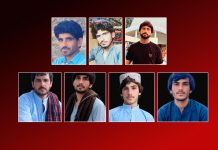Author: Helena Baloch
Abstract
This study analyzes the systematic and widespread enforced disappearances in Balochistan, particularly targeting Baloch students, exposing a chilling reality: the erosion of constitutional safeguards and the impunity with which state institutions operate. The disappearance of countless Baloch individuals, both within and outside Balochistan, over the past decades underscores the crisis of human rights and the violation of fundamental principles of justice in the region.
Introduction
This research delves into the pervasive phenomenon of enforced disappearances in Balochistan, a region plagued by systematic human rights violations. While the term “enforced disappearance” refers to the clandestine detention or abduction of individuals, followed by the denial of their whereabouts, in Balochistan, this practice has evolved into a chilling instrument of state repression. For over two decades, thousands of Baloch individuals, including students, have vanished without a trace, leaving their families in a state of perpetual uncertainty and anguish. The annexation of Balochistan by Pakistan in 1948, coupled with a long-standing separatist movement, has fueled tensions and created an environment conducive to such disappearances.
This study examines the broader context of human rights violations in Balochistan, focusing on the specific issue of enforced disappearances. It explores the implications of these actions on the fundamental rights of individuals, including the right to life, liberty, and security of the person.
Historical Background
Enforced disappearances in Balochistan represent a deeply entrenched issue that has evolved over decades, rooted in the region’s complex socio-political landscape and its historical quest for autonomy and rights. The origins of this phenomenon can be traced back to the late 1940s, shortly after the partition of British India and the creation of Pakistan in 1947. The Baloch people, who inhabit a resource-rich region, sought greater autonomy and recognition of their rights within the newly formed state. However, the central government’s reluctance to address these aspirations led to rising tensions and the emergence of nationalist movements advocating for Baloch rights and self-determination.
The first significant wave of enforced disappearances occurred during the Baloch insurgency of the 1970s, sparked by the government’s attempts to integrate Balochistan more fully into Pakistan. The military operation launched in 1973 under then-Prime Minister Zulfikar Ali Bhutto aimed to suppress the Baloch nationalist movement. This brutal crackdown resulted in widespread human rights violations, including the abduction of thousands of Baloch individuals, many of whom were political activists, students, and tribal leaders. The state’s response was characterized by a systematic campaign of terror, with enforced disappearances becoming a tool to instill fear and silence dissent. Many families were left in anguish, searching for their loved ones while the state denied any involvement in these abductions.
The issue of enforced disappearances resurfaced with renewed intensity in the early 2000s, coinciding with the resurgence of Baloch nationalism and the emergence of new militant groups. The Pakistani military’s operations against these groups were marked by allegations of extrajudicial killings and enforced disappearances. Reports from human rights organizations indicated that state security forces, including the military and intelligence agencies, were involved in abducting individuals suspected of being affiliated with nationalist movements. These disappearances often targeted not only militants but also political activists, journalists, and ordinary citizens who voiced dissent against the state.
This period saw the establishment of various human rights organizations and advocacy groups that began documenting cases of enforced disappearances and raising awareness about the plight of the Baloch people. The impact on families and society has been profound and devastating. Families of the disappeared endure immense psychological trauma, living in a state of uncertainty and fear regarding the fate of their loved ones. The emotional toll is compounded by the stigma associated with disappearances, as families often face social ostracism and economic hardships.
Baloch women have emerged as prominent figures in the struggle against enforced disappearances. They have organized protests, marches, and sit-ins, often braving harsh weather and state repression to demand justice and accountability. The “Voice for Baloch Missing Persons” (VBMP) is one such organization that has played a crucial role in advocating for the rights of the families of the disappeared, bringing international attention to their plight.
Despite growing activism and international condemnation, the Pakistani government has been slow to implement meaningful reforms or address the concerns raised by human rights organizations. The culture of impunity surrounding state security forces continues to perpetuate the cycle of violence and repression. Reports of ongoing abductions persist, with families frequently receiving little to no information about the fate of their loved ones. The lack of accountability for these human rights violations has led to a pervasive sense of despair among the Baloch population, who feel marginalized and oppressed by the state.
Case Studies
Feroz Baloch
Feroz Baloch, a student from Absor, Turbat, pursued higher education at Arid University, Rawalpindi, in hopes of a safer future. However, on May 11, 2022, he was last seen heading to the library, never to return. Despite protests by the Baloch Students Council and his family, his whereabouts remain unknown.
Ahmed Khan
Ahmed Khan, from Balgatar, Turbat, was pursuing a Bachelor of Education at Arid Agriculture University. His abduction led to widespread protests and social media campaigns. Demonstrations at the National Press Club in Islamabad called for his release, emphasizing the psychological and social impact of such disappearances.
Anees Baloch
Anees-Ur-Rehma, a computer science graduate from Bahauddin Zakariya University, was forcibly taken from ‘Café PUBG’ in Khuzdar. His abduction, witnessed by bystanders, sparked local and international condemnation, with activists demanding an end to enforced disappearances.
Effects of Enforced Disappearances
The effects of state violence on the Baloch people are profound and multifaceted, impacting their social, economic, political, and psychological well-being. Enforced disappearances serve as a means to silence dissent and suppress political movements advocating for Baloch rights. Families of the disappeared endure psychological trauma, economic hardship, and social stigma.
Extrajudicial killings under the guise of counter-terrorism operations further exacerbate the crisis. The culture of impunity surrounding these killings perpetuates a cycle of violence, while the judiciary’s failure to hold perpetrators accountable erodes the rule of law. Socioeconomic marginalization remains a major concern, with Baloch communities deprived of basic services, education, and economic opportunities despite Balochistan’s rich natural resources.
Conclusion
The pervasive practice of enforced disappearances in Balochistan is a grave violation of human rights, exposing the impunity of governmental institutions and raising serious constitutional concerns. The cases of Feroz Baloch, Ahmed Khan, and Anees Baloch illustrate the deep terror instilled among the Baloch people. The practice has led to severe psychological, social, and economic consequences. Despite protests and international criticism, enforced disappearances continue unabated. This crisis necessitates urgent accountability, transparency, and policy reforms. Without systemic change, the plight of the Baloch people will only worsen with each passing day.
Disclaimer: The views and opinions expressed in this article are those of the author and do not necessarily reflect the official policy or position of The Balochistan Post or any of its editors.






























